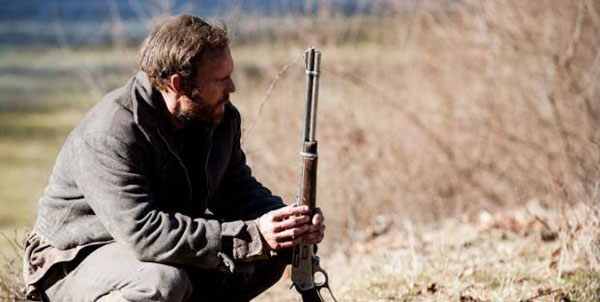Child of God, which premiered in Venice and was a Special Presentation in Toronto, screens just once more at the New York Film Festival, tomorrow (Tuesday) at noon. “Based on the Cormac McCarthy novel of the same title, it was directed by the apparently tireless James Franco, whom it’s time to start taking seriously, at least as a filmmaker,” argues Manohla Dargis in the New York Times. “The movie, stark and often gravely beautiful, features a heroic performance from Scott Haze as an outcast who, with a gun in hand, descends into soul-crippling isolation and then spirals into madness in the Tennessee backwoods. Despite a few missteps, including a scene of on-screen defecation that’s so aggressively up close and personal that it approaches 3D, Mr. Franco settles into his story with confidence, lyricism and compassion.”
But R. Kurt Osenlund, writing for Slant, senses “an off-putting aura that looms over the film at large, and implies that its maker is one of arbitrary, sophomoric, and, at last, indulgent proclivities. To call Franco ‘indulgent’ may sound like a no-brainer at this point, but since the restless, outré A-lister has thus far balanced his virtually peerless ubiquity with screwball comedy, queer interests, no-gig-too-small guest spots, and ‘prestigious’ literary pursuits, it seems the jury remains out on whether there’s true virtue and validity to all that self-aggrandizement. With Child of God, it may finally be time to call ‘bullshit,’ at least in regard to Franco as a filmmaker.”
“Let it be said,” grants Adam Nayman at Reverse Shot, “that it does take some cojones to make a movie out of what might be McCarthy’s most stylistically abstruse (and yet thematically obvious) novel: published in 1973, before its author was a Harold Bloom-ratified national treasure, Child of God is so variegated in its narration that the prose sometimes appears to be flying apart before the reader’s eyes. The schizophrenic (and rarely signaled) switching between omniscient and first-person description is both a literary flourish and perhaps a sincere attempt to present the craziness of his main character, Lester Ballard, a man who is at once trapped inside his own head and prone to almost out-of-body bursts of extreme violence and depravity.”
“To his credit,” adds Time Out New York‘s David Fear, “Franco doesn’t soft-peddle the book’s squeamish aspects—murder, insanity and necrophilia, oh my!—though the film’s po-faced attempts to match McCarthy’s poetic, macabre prose don’t add much to this tale of rural misanthropy, either.”
“While the movie’s bold chapter markers and a late cameo from Franco himself as a seasoned vigilante hint at the directorial arrogance that, frankly, I expected going into the screening,” writes Carson Lund at In Review Online, “Child of God’s moment-to-moment emphasis on character, the casual building of atmosphere and the general evasion of any announcements of Big Themes forms an unexpectedly different picture, one with an admirable balance of reverence for and self-imposed liberty from its source material.”
Gerard Raymond at the House Next Door: “Franco has said that he sees the McCarthy story as an extreme way to examine the universal need for one human to make a connection with another—the need to love and be loved. In his desperate attempt to make that connection, Ballard finally crosses the line after he accidentally encounters a couple asphyxiated in their car (a suicide pact?) and decides to bring the young woman’s corpse home. Franco and Haze handle the ensuing scene, in which Ballard perversely conducts a courtly conversation with his quarry before he rapes his new imaginary friend with great finesse, infusing it with a grotesque sweetness that lingers even as our own ethical and moral responses kick in.”
“Haze gives one of the most committed and startling performances likely to be seen this or in most years,” writes Aaron Dobbs at Hammer to Nail, “while Aaron Embry’s score and Christina Voros’s muted cinematography enhance the senses of isolation and loneliness that drive Lester to perform some despicable and horrific acts.”
“You know what?” Joshua Chaplinsky at Twitch: “I’m starting to think maybe Franco has the chops to pull off those Faulkner adaptations. Maybe he is the right director for Zeroville, one of my favorite novels, which he owns the rights to. His directorial output up until now has been viewed as sort of joke, but after seeing Child of God, Hallelujah! I’ve seen the light!”
NYFF 2013 Index. For news and tips throughout the day every day, follow @KeyframeDaily on Twitter and/or the RSS feed. Get Keyframe Daily in your inbox by signing in at fandor.com/daily.





